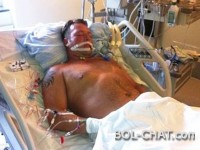This angered him and returned to life: A victim of a stroke who could not speak, heard how doctors talk about selling his organs
The patient who survived the stroke was paralyzed in the hospital and listened to the horror as the doctors told his girl that they would not survive, and later, talking to each other about the sale of his organs for quick earnings
Jimi Fritzie (43), heard every word but could not protest because he was not able to move or speak.
"Only my ears and eyes worked. They (doctors) told my girl there was no hope. "
His family of broken hearts and friends came to forgive once the doctors found the brain scan to have "zero chance" to pull out.
As they surrounded his hospital bed, the doctors asked the family about the possibilities of donating his organs when he died, not realizing that Mr. Fritzie could hear the conversation.
He eventually recovered after his family sought another opinion from another physician, who quickly realized that Jimi Fritzie was fully aware of and could have complete recovery.
He got cortisone and swelling in the brain splashed. It took three weeks before she was able to tell her story about the nightmare she had heard in a medical talk about selling her organs.
He filed an official lawsuit against a doctor for violating the rules by discussing organ donation to a patient who thought his brain was dead, as reported by The Local.
Recently, the Wall Street Journal has released a shocking report on the donated organs industry, claiming that doctors regularly take organs from patients who are still alive. New US regulations allow physicians to "inject a paralyzer" if the body does not stop moving to "safely" remove the organs.
Frequent hospitals can earn more money from the dead body due to the use of organs than they can earn from paying the cost to the patient whose lives have been saved. This is particularly true in cases where a patient does not have a health insurance, and it will be difficult to charge a huge medical bill.
The new regulations have proved to be controversial among medical staff, and many anesthesiologists and nurses have been screened from the organ donor register after they have been testifying the "cortex" and chest during the organ removal surgery.
But Mr Fritzie could not even write or move so the doctors knew they could hear how they talked about what they could do with his organs.
Mr. Fritz, who suffered brain bleeding while he and his girlfriend and family were resting on the Gothenburg archipelago, now raises the lawsuit against the hospital and demands that doctors reconsider the investigation due to the association with the black market of organs.
The hospital spokesperson said they cooperated with the investigators and that they would come to the bottom of what had just happened.
- 7 Dec, 2017
- 1356 views
- No comments


